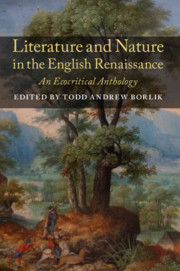Book contents
- Frontmatter
- Contents
- List of Illustrations
- Acknowledgements
- Editorial Principles: Towards the Ecocritical Editing of Renaissance Texts
- Introduction
- PART I Cosmologies
- PART II The Tangled Chain
- PART III Time and Place
- PART IV Interactions
- PART V Environmental Problems in Early Modern England
- PART VI Disaster and Resilience in the Little Ice Age
- Extreme Weather, Disorder, Dearth
- Decay
- Resilience
- Appendix A Industrialization and Environmental Legislation in the Early Anthropocene: A Timeline
- Appendix B Further Reading: A Bibliography of Environmental Scholarship on the English Renaissance
Extreme Weather, Disorder, Dearth
from PART VI - Disaster and Resilience in the Little Ice Age
Published online by Cambridge University Press: 05 June 2019
- Frontmatter
- Contents
- List of Illustrations
- Acknowledgements
- Editorial Principles: Towards the Ecocritical Editing of Renaissance Texts
- Introduction
- PART I Cosmologies
- PART II The Tangled Chain
- PART III Time and Place
- PART IV Interactions
- PART V Environmental Problems in Early Modern England
- PART VI Disaster and Resilience in the Little Ice Age
- Extreme Weather, Disorder, Dearth
- Decay
- Resilience
- Appendix A Industrialization and Environmental Legislation in the Early Anthropocene: A Timeline
- Appendix B Further Reading: A Bibliography of Environmental Scholarship on the English Renaissance
Summary
In this interlude performed before King Henry VIII, Jupiter descends to earth to determine what type of weather mortals most prefer. The answer proves to be remarkably varied, contingent on a person's profession, socio-economic status, gender, or age. A lengthy debate between a wind miller and a water miller documents the widespread practice in Tudor England of harnessing renewable energy from the elements. Yet the play also insinuates that while some trades might suffer from irregular weather patterns, others could capitalize on the resultant economic trends (a Tudor equivalent of climate-change profiteering, which Jupiter must regulate). The extract below offers a neat recapitulation of the plot. Although internal evidence suggests it was composed around 1533, the play is undeniably inspired by the meteorological trauma of the late 1520s (Ailles). The water miller complains that grain prices have been high “this seven year,” which tallies with the sudden spike in late 1526 due to heavy rains and ensuing dearth. The following year, 1527, was one of the wettest ever recorded in England (rain fell almost continuously from April to June), and the next two years were not much drier. In response to soaring food costs, the king issued several proclamations around this time to prohibit grain hoarding, restrict food exports, and curtail enclosure, just as Jupiter here staves off a potential crisis. Heywood's play thus seeks to contain anxiety over climatic variability by transforming it into a metaphor for the vagaries of royal favour.
Source: The Play of the Weather (1533), D3v–F1v.
MERRY REPORT Oyez! ° If that any knave here,
Be willing to appear,
For weather foul or clear,
Come in before this flock,
And be he whole or sickly,
Come show his mind quickly,
And if his tale be not likely,°
Ye shall lick my tail in the nock! °
All his time I perceive is spent in waste
To wait for more suitors; I see none make haste.
Wherefore I will show the god all this process,
And be delivered of my simple office.
Now lord, according to your commandment,
Attending suitors I have been diligent,
And at beginning as your will was I should,
I come now at end to show what each man would.
The first suitor before yourself did appear,
A gentleman desiring weather clear:
Cloudy nor misty, nor no wind to blow,
For hurt in his hunting.
- Type
- Chapter
- Information
- Literature and Nature in the English RenaissanceAn Ecocritical Anthology, pp. 497 - 530Publisher: Cambridge University PressPrint publication year: 2019



